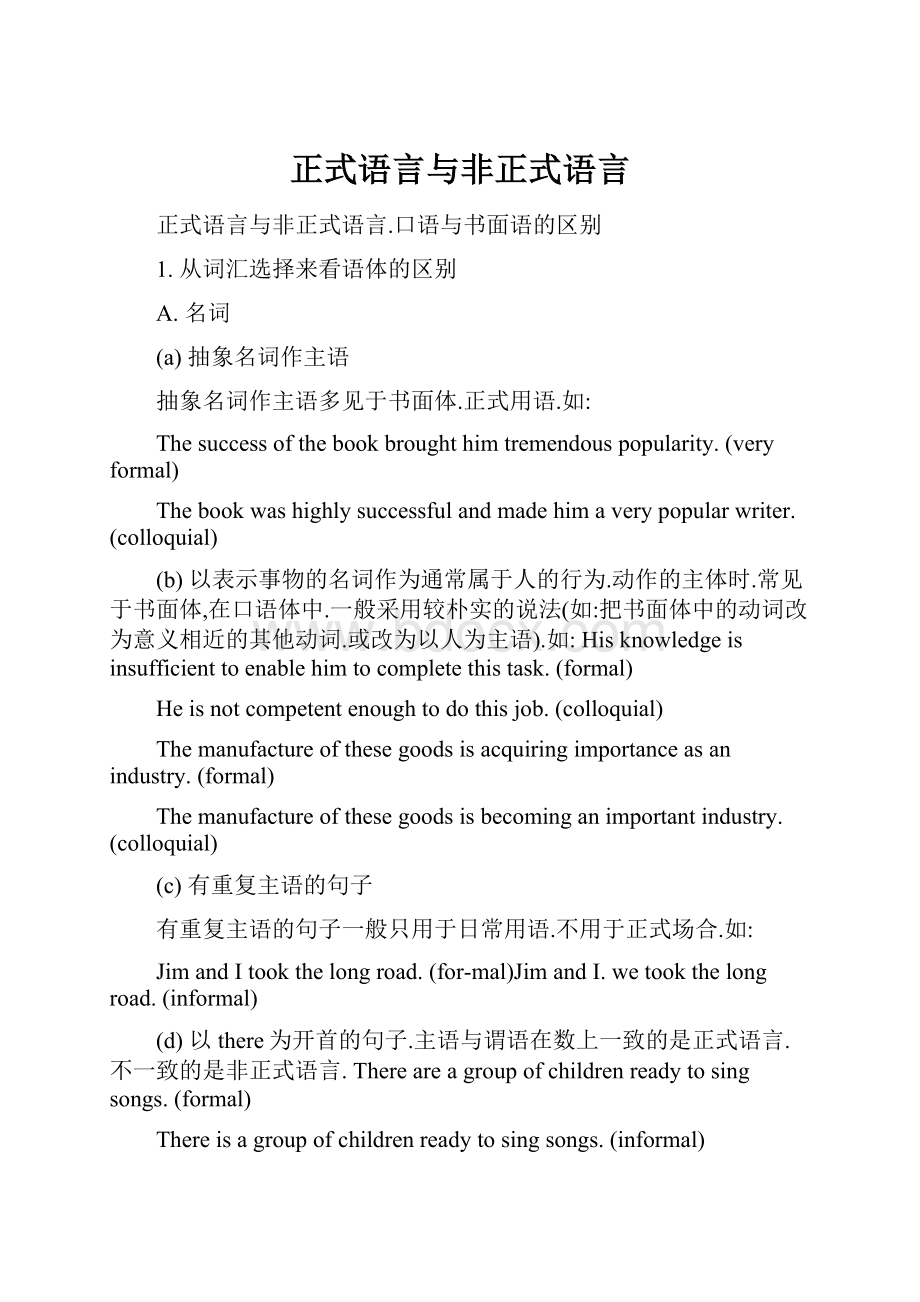 正式语言与非正式语言.docx
正式语言与非正式语言.docx
- 文档编号:28773507
- 上传时间:2023-07-19
- 格式:DOCX
- 页数:11
- 大小:21.20KB
正式语言与非正式语言.docx
《正式语言与非正式语言.docx》由会员分享,可在线阅读,更多相关《正式语言与非正式语言.docx(11页珍藏版)》请在冰豆网上搜索。

正式语言与非正式语言
正式语言与非正式语言.口语与书面语的区别
1.从词汇选择来看语体的区别
A.名词
(a)抽象名词作主语
抽象名词作主语多见于书面体.正式用语.如:
Thesuccessofthebookbroughthimtremendouspopularity.(veryformal)
Thebookwashighlysuccessfulandmadehimaverypopularwriter.(colloquial)
(b)以表示事物的名词作为通常属于人的行为.动作的主体时.常见于书面体,在口语体中.一般采用较朴实的说法(如:
把书面体中的动词改为意义相近的其他动词.或改为以人为主语).如:
Hisknowledgeisinsufficienttoenablehimtocompletethistask.(formal)
Heisnotcompetentenoughtodothisjob.(colloquial)
Themanufactureofthesegoodsisacquiringimportanceasanindustry.(formal)
Themanufactureofthesegoodsisbecominganimportantindustry.(colloquial)
(c)有重复主语的句子
有重复主语的句子一般只用于日常用语.不用于正式场合.如:
JimandItookthelongroad.(for-mal)JimandI.wetookthelongroad.(informal)
(d)以there为开首的句子.主语与谓语在数上一致的是正式语言.不一致的是非正式语言.Thereareagroupofchildrenreadytosingsongs.(formal)
Thereisagroupofchildrenreadytosingsongs.(informal)
(e)所有格
Thehoodofthecarisinsulated.(formal)
Thecar`shoodisinsulated.(informal)
(f)缩略语与全称
正式语言常用全称.非正式语言常用缩略语.虽然在正式语言中用缩略语的情况越来越多.但在非正式语言中缩略语用得更多.如:
TV.VOA.BBC.VIP.etc.当然在一些个别场合.书面语中可用缩略语.而口语中不使用.
(g)关于单复数
在泛指时.用复数偏通俗化.用the加单数比较文气.如:
Thecowisausefulanimal.(alittleliterary)
Cowsareusefulanimals.(alittlevulgar)
B.形容词
口语体中所用的形容词往往是人们最常用的形容词.这些形容词往往一词多义,而书面体中所用的形容词则往往不那么常用.这些形容词的含义往往不如口语体中所用的形容词的含义那么广泛.但其含义却往往具体.有特殊性.
C.副词
与形容词同形的英文副词往往用于口语.但诗歌中有时也用这种形式.然而.这些词却很少用于其他方面的正式用语.如:
Workslowlyandsteadily.(formal)
Workslowandsteady.(informal)
D.介词
在一些状语或定语中.省略介词的属于口语.保留介词的属于书面语.如:
Ithappenedthedayhedidtheexperiment.(informal)
Ithappenedonthedayonwhichhedidtheexperiment.(formal)I`llcomeinthefollowingspring.(formal)
I`llcomethefollowingspring.(colloquial
E.代词
(a)口语中多省略作主语的代词.如:
Haven`tseenyouforages!
(informal)
(b)关于mine.his.yours.Ours
当mine.his.yours.ours等物主代词作宾语或表语时.可用于书面语.也可用于口语.但如果这种物主代词(或名词所有格)作主语放在句首.并暗指表语名词所用的概念.那就是一种比较文雅的说法了.如:
His(orMr.Li`s)isanoblecharacter.
在日常口语中一般这么用:
His(orMr.Li`s)characterisanobleone./Hehasanoblecharacter.但下面这类句子对书面语和口语都适用:
Yourteacherandminearetalkingintheroom.
(c)we.I在一些正式场合.作者或演讲人为了表示谦虚.往往避免用I.而用we代替.如:
Asweshowedamomentago...(formal)
AsIsaidamomentago...(notsoformal)
(d)you.we用we代替you是一种表示客气的语言.如:
Don`tworryaboutyourshoes!
(imperative)
Whydon`twenotworryaboutyourshoes.OK?
(polite)
(e)you.one在翻译中文"任何人"."谁都"等时.译成one为formallanguage.译成you为informallanguage.如:
Onemustloveone`scountry.(formal)
Youmustloveyourcountry.(informal)
(f)关于I.me.he.him.etc.
Hesaysshesawyouandme.(formal)
HesaysshesawyouandI.(inform
al)
F.动名词
在书面语中.一般用物主代词或名词所有格来修饰动名词短语.以表示行为者.如:
Mr.LidislikesZhangHui`scominghomelate.
Therewillbelittlechanceofmyvisitingtheplaceagain.
LiWen`sfallingillsuddenlygavemeasurprise.
口语中一般以代词的宾格或名词普通格加分词.for加宾语加不定式.从句.独立句等方式表达.如:
Mr.LidislikesZhangHuicominghomelate.
Therewillbelittlechanceformetovisittheplaceagain.
LiWenfellillsuddenly.Thisgavemeasurprise.
G.关于缩写
用缩写形式多为非正式语言.而用非缩写形式多为正式语言.如:
donot.weare.Iam.Ihave.thereis.cannot.willnot等多见于正式语言.而don`t.we`re.I`m.I`ve.there`s.can`t.won`t多见于非正式语言.exam.bike等多用于口语.examination.bicycle等多用于书面语.oh.dear.why.well等是口语中常见的感叹词.
2.从句法来看语体的区别
A.修饰语
在书面文字中.修饰语可以与中心词相隔较远.修饰语也可以较长.而在口语中则相反.如:
Thereexistcomplexcomputationsinscienceandengineeringwhichpeopleareunabletomake.(written)
Therearecomplexcomputationsinscienceandengineering.andpeopleareunabletomakethosecomputations.(colloquial)
B.句子的长短
一般来说.书面语句子较长.口语句子较短.
(a)议论文.商业或法律公文等书面语不仅常用较长的修饰语.而且有时用较长的插入语.甚至插入语中还有插入语.但在一般的口语中则不用较长的插入语.常用的较短插入语有:
ofcourse.forexample.Ibelieve.Ithink.yousee.youknow.tobefrank.etc.
(b)在书面语中.一个句子有时有好几个关系代词,而口语中关系代词则用的极少.往往被分成几个简单句.如:
Theseneedles.whichweremadeoffish-shapedpiecesofironthatfloatedonwater.wereactedonbytheearth`smagneticfield.(formal)
Theseneedlesweremadeoffish-shapedpiecesofironthatfloatedonwater.Theywereactedonbytheearth`smagneticfield.(informal)
C.关于时态
在现在的口语中.有时用过去时代替现在完成时.如:
-Isanybodyusingthischair?
-No.Isaveditforyou.
在口语中常用现在时代替将来时.如:
Sheiscomingtomorrow.
在口语中有时用一般现在时说明一个已经发生了的动作.如:
Hesaysitisveryimportant.
D.虚拟语气
(a)不够熟悉的人之间对话.或在正式场合演讲.对话时.一般用虚拟语气来陈述自己的看法.提出请求或邀请.提出建议或劝告.提出问题.如:
IfMr.Wangwasherenow.hewouldtellyouaboutit.(informal)
IfMr.Wangwereherenow.hewouldtellyouaboutit.(formal)
(b)有一些表示主观愿望和情绪的形容词.如desirous等要求后面的状语从句的谓语动词用虚拟语气.这种结构主要用于书面语中.口语中往往用不定式来代替这种从句.如:
Hewasanxiousthatweshouldstayfordinner.(formal)
Hewasanxioustohaveusstayfordinner.(informal)
E.语序
在书面语中.为了使句子平衡对称.或为了表示强调.常把状语.表语.宾语等成分放在句首.并将主谓次序颠倒过来,而口语体则一般用自然语序.
F.关于省略
(a)在正式文字或正式场合的对话中.一般要用完整的句子.在口语中用省略句较多.主要是为了节省时间.使对话自然.生动.简洁.有力.如:
Wheretogonow?
Whynotdoitthisway?
(b)在正式语言中.所省略的部分一般都是前边出现过的.如:
Hehadfinishedtheworkandgonehome.
(c)关系代词在限定性定语从句中做谓语动词宾语或介词宾语时.在口语中一般省去.如:
Thegirlyouspoketojustnowismysister.
(d)宾语从句前的that在口语中往往省去.表语后面的从句之前的that在口语中也常省去.如:
HesaidhewouldgotoLondon.
I`mafraidheisright.
G.主谓语的一致性
在有些情况下.非正式语言中常按意思决定动词的单复数.所以主语和谓语在数上可能不一致.如:
Neitherhenorhiswifehavearrived.(informal)
Neitherhenorhiswifehasarrived.(formal)
(DavidParkdesigns&teachesIELTScoursesforindividuals&groups.HewascontractedbytheBritishCounciltoprovidethisarticle.)
AstudentpreparingforIELTS(InternationalEnglishLanguageTestingSystem)sentmethisquery:
“Idon?
tknowif…sparkoff?
isaformalwordornot.HowcanItellthedifferencebetweenformalandinformalwords?
”Here?
swhatIsaidtoherinmyreply:
Englishhasthreemainstyles:
formal,informalandpopular.
FormalEnglish
FormalEnglishismainlyusedinwriting.Thisstyleisacademicintoneandiscommonlyusedinacademictextbooks,mostuniversityessays,businesslettersandcontracts.
Inthecaseofspeaking,formalEnglishisusuallyonlyusedforofficialorseriousoccasions,e.g.,toformallywelcomeguestsatauniversitygraduationceremony.
FormalEnglishusesmorecomplexvocabularythaneverydayspeech.Forexample,itusesmany“bigger”wordsthataren?
tnormallyusedinconversation.Examplesaremulti-syllablewordslikecompensate,ascendandinterrogate.Italsoprefersone-partverbs(e.g.,establish)insteadofsimpler,phrasalverbs(e.g.,setup).Slangandcolloquialvocabularyareavoided.
WhenformalEnglishisusedinwriting,sentencestendtobelongandcomplex,andgrammarrulesarefollowedstrictly.Ittendstobeimpersonal(orneutral),oftenusingimpersonalpronounslikeitandpassiveverbs.Contractedandabbreviatedformsofwordsareusuallyavoided.
Informal&popularEnglish
InformalEnglishisthelanguagespokenbymostpeopleeveryday.It?
salsowidelyusedinemailsandletterstofriends.
SpeakersofinformalEnglisharen?
tveryconcernedabouttheirvocabulary.Forexample,informalEnglishusesmanyshortwords(e.g.,fire,climbandask),muchcolloquialvocabulary(e.g.,stuff,alotof,thingandsortof)andmulti-partverbs(e.g.,setupinsteadofestablish).InformalEnglishisalsomorerelaxedaboutgrammarrulesthanformalEnglish,usingsimplergrammaticalstructuresandloosely-connectedsentencesandphrases.
Whenusedinwriting,informalEnglishusesfirstandsecondpersonpoints-of-view(e.g.,I,youandwe)tocreateamorepersonalstylethanformalEnglish.Contractions(e.g.,it?
sinsteadofitis)
arealsoverycommon.Aswell,informalEnglishtendstouseshortersentencesthaninmoreformalwriting,andthemoreformalpunctuationmarks?
thesemi-colon(;)andcolon(:
)?
areusuallyavoided.
PopularEnglishisrarelyusedinwriting,beingusedmostlyinspokenEnglish.Itincludesagoodbitofslang.Slangiswordsorexpressionsthatareveryinformalandarenotconsideredsuitableforpolitespeechormoreformalsituations.Slangisoftenusedonlybyparticularsocialgroupsorprofessions.
Moreonphrasalverbs
Whenpeoplespeakorwriteinformally,theyoftenusephrasalverbs(alsocalledmulti-wordormulti-partverbs).Herearesomeexamples.Theformal,one-wordverbwiththesamemeaningisinbrackets.
Phrasalverbs&single-wordequivalents
askfor(request)godownwith(contract)
setup(establish)dealwith(handle)
findout(discover)takein(deceive)
PhrasalverbsareverycommoninspokenEnglish.However,they?
reusuallylessformalthantheirone-wordverbequivalents.
Informalwriting,writersoftenprefertousesingle-wordverbs,suchasexamineordevise,ratherthanphrasalverbs,suchaslookatorcomeupwith.Comparethepairsofverbsinthenexttable.
Thoughthere?
satendencytousefewerphrasalverbsinformallanguage,it?
snotwrongtousethem.Nevertheless,ifthere?
saone-wordverbthat?
smoreformal,thenuseit.
Don?
tthinkthatafewphrasalverbsinyourIELTSwritingwillmakeittooinformal.Infact,therearemanysituations-eveninquiteformaltexts-whenaphrasalverbisthemostnatural-soundingwayofexpressinganidea.Forinstance,putonismuchmorenaturalthantheformal,single-wordequivalentdon.
Informal
Moreformal
Hecheckeduponhisaccountant.Heinvestigatedhisaccountant.
Theyputupwiththeirneighbours.Theytoleratedtheirneighbours.
Shecaughtonveryquickly.Sheunderstoodveryquickly.
Shemadeupforitwithanearlynight.Shecompensatedforitwithanearlynight.
Hewentdownwithafever.Hecontractedafever.
Thecostoflivingwentup.Thecostoflivingincreased/rose.
Tellingthedifference
It?
susuallyeasytodecideifawordisinformalorform
- 配套讲稿:
如PPT文件的首页显示word图标,表示该PPT已包含配套word讲稿。双击word图标可打开word文档。
- 特殊限制:
部分文档作品中含有的国旗、国徽等图片,仅作为作品整体效果示例展示,禁止商用。设计者仅对作品中独创性部分享有著作权。
- 关 键 词:
- 正式 语言 非正式
 冰豆网所有资源均是用户自行上传分享,仅供网友学习交流,未经上传用户书面授权,请勿作他用。
冰豆网所有资源均是用户自行上传分享,仅供网友学习交流,未经上传用户书面授权,请勿作他用。


 《贝的故事》教案4.docx
《贝的故事》教案4.docx
